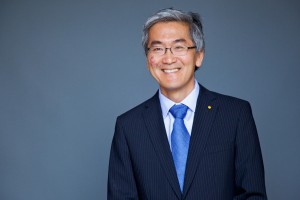Our next leap forward in materials innovation
[sharexy]

Jun Nogami, Professor & Chair
I recently broke my collarbone in an accident—I slipped on black ice while riding my bicycle. An x-ray on my shoulder revealed a fracture that necessitated a titanium plate to be surgically inserted on my right-side clavicle to hold it in place while it heals.
Faster healing, smarter computing and safer cars are just some of the achievements we are making because of smaller, stronger, lighter and generally more capable materials.
This incident reminded me of past and present biomaterials research in our department: the past being the development of improved titanium hip implants by Professor Emeritus Robert Pilliar, the ongoing work of Associate Professor Eli Sone on bio-adhesion and Assistant Professor Benjamin Hatton’s exploration of anti-microbial and non-wetting surfaces to improve surgery and hospital care. These are just some examples of how far materials development has progressed, and its impact on almost every facet of human advancement. Faster healing, smarter computing and safer cars are just some of the achievements we are making because of smaller, stronger, lighter and generally more capable materials.
And so, in this issue, I am privileged to share with you our next leap forward in materials innovation.
Last summer, after ten years in the making, Professor Doug Perovic and his collaborators unveiled the Ontario Centre for the Characterization of Advanced Materials (OCCAM) at the University of Toronto. Supported primarily by the Canada Foundation for Innovation (CFI), the Ontario Ministry of Research & Innovation and in partnership with Hitachi High-Technologies Canada, our part of the OCCAM facility houses some of the most powerful electron microscopes in the country. These specialized tools will allow us to better understand and manipulate matter at the atomic scale. But more importantly, our advanced research capabilities will open the door for multidisciplinary collaborations from both academia and industry, paving the way for new opportunities that will benefit our students for years to come.
Jun Nogami, PhD, FAAAS, PEng
Professor & Chair
Contact the editor-in-chief
T: +1 416 946-3211 | E: mse.impact@utoronto.ca
General inquiries
T: +1 416 978-3012 | E: materials.engineering@utoronto.ca
Enjoyed Impact? Complete a readership survey for a chance to win an exclusive U of T MSE prize pack.